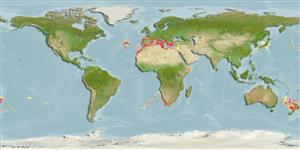Elasmobranchii (sharks and rays) >
Squaliformes (Sleeper and dogfish sharks) >
Somniosidae (Sleeper sharks)
Etymology: Somniosus: Latin for sleepy, reflecting Lesueur’s surmise that these sharks are slow or sluggish because of their relatively small fins (hence the name sleeper sharks). (See ETYFish); rostratus: Latin for beaked, referring to its elongated rostrum. (See ETYFish).
More on author: Risso.
Environment: milieu / climate zone / depth range / distribution range
Ecology
Marine; bathydemersal; depth range 200 - 1330 m (Ref. 104125). Deep-water; 47°N - 43°S
Northeast Atlantic: Madeira, France, and western Mediterranean.
Length at first maturity / Size / Weight / Age
Maturity: Lm 108.0, range 82 - 134 cm
Max length : 143 cm TL male/unsexed; (Ref. 26346); common length : 100.0 cm TL male/unsexed; (Ref. )
Dorsal spines (total): 0; Anal spines: 0. Diagnosis: Somniosus rostratus is distinguished from S. longus in having overall length of second dorsal shorter than first dorsal fin 76-88% (vs. almost equal 91-100%); horizontal diameter of eye less than 37% (mean 33%) of length from snout tip to eye (vs. >37, mean 46%); number of tooth rows in upper jaw 53 (vs. 56-57); and spiral valve counts 23 (vs. 26-27) (Ref. 50224).
A rare species (Ref. 26346) found on outer continental shelves and upper slopes (Ref. 247). Probably feeds on deepwater bottom fishes and invertebrates (Ref. 247). Ovoviviparous (Ref. 205), length at birth 21-28 cm TL (Ref. 26346). Utilized as fishmeal and possibly as food fish (Ref. 247).
Life cycle and mating behavior
Maturities | Reproduction | Spawnings | Egg(s) | Fecundities | Larvae
Ovoviviparous (Ref. 247). Young born at 21-28 cm (Ref. 26346). Distinct pairing with embrace (Ref. 205).
Yano, K., J.D. Stevens and L.J.V. Compagno, 2004. A review of the systematics of the sleeper shark genus Somniosus with redescriptions of Somniosus (Somniosus) antarcticus and Somniosus (Rhinoscymnus) longus (Squaliformes: Somniosidae). Ichthyol. Res. 51:360-373. (Ref. 50224)
IUCN Red List Status (Ref. 130435)
Threat to humans
Harmless
Human uses
Fisheries: minor commercial
Tools
Special reports
Download XML
Internet sources
Estimates based on models
Preferred temperature (Ref.
123201): 8.6 - 14.2, mean 13.2 °C (based on 122 cells).
Phylogenetic diversity index (Ref.
82804): PD
50 = 0.5313 [Uniqueness, from 0.5 = low to 2.0 = high].
Bayesian length-weight: a=0.00389 (0.00168 - 0.00901), b=3.13 (2.94 - 3.32), in cm total length, based on LWR estimates for this (Sub)family-body shape (Ref.
93245).
Trophic level (Ref.
69278): 4.2 ±0.4 se; based on diet studies.
Resilience (Ref.
120179): Low, minimum population doubling time 4.5 - 14 years (Fec assumed to be <100).
Fishing Vulnerability (Ref.
59153): Very high vulnerability (86 of 100).
Climate Vulnerability (Ref.
125649): Moderate vulnerability (39 of 100).
Nutrients (Ref.
124155): Calcium = 5.4 [1.0, 29.5] mg/100g; Iron = 0.286 [0.068, 0.948] mg/100g; Protein = 19.4 [17.1, 21.6] %; Omega3 = 0.269 [0.098, 0.861] g/100g; Selenium = 18.7 [5.6, 56.5] μg/100g; VitaminA = 11.3 [2.3, 57.4] μg/100g; Zinc = 0.292 [0.137, 0.565] mg/100g (wet weight);
